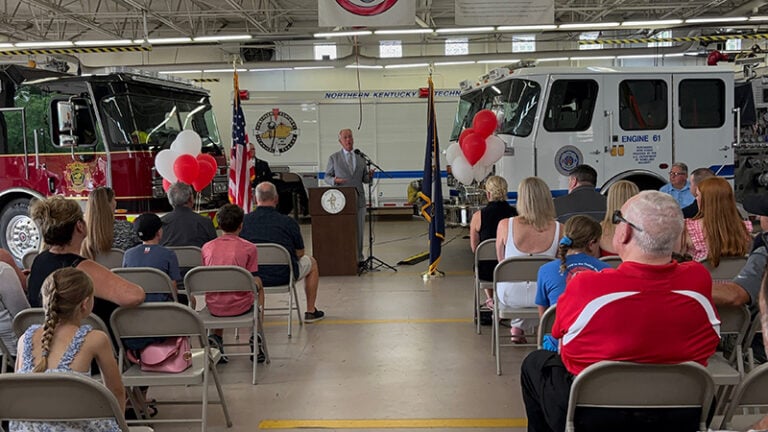By Mark Hansel
NKyTribune Managing Editor
Community members came together at Highland Hills Church in Fort Thomas Monday night to discuss a faith-based solution to the region’s heroin problem.
The three-hour program, titled “When God steps in, miracles happen,” included stories from recovering addicts, inspirational hymns, a panel discussion and audience participation.
Donna Blanchet, who is in recovery from heroin addiction, spoke of how her journey from addiction to recovery was fueled by faith.

At her lowest point Blanchet turned to prostitution and stole the family furniture and her children’s toys to feed her habit.
“I would do disgusting things sometimes for five minutes in a warm car,” Blanchet said.
She spoke of being homeless for more than three years on McMicken Avenue in Over-the-Rhine, and using heroin every day during one of her seven pregnancies.
The child she gave birth to spent four months being treated for withdrawal.
With the help of Love City Church in Norwood, Blanchet managed to crawl out from under the scourge of addiction. She is clean now and graduated from college in February.
She is pursuing a career as a medical assistant, which has been difficult because of convictions for two felonies and more than 50 misdemeanors, but recently found work.
“I went from seeing a shadow of hope to being a shadow of hope,” Blanchet said.
More than 200 people from all walks of life filled the Fort Thomas church, an indication of just how deeply the addiction problem has permeated the region.
The panel included health care professionals, law enforcement officials, a state legislator and a local pastor. Contributors discussed supplementing traditional treatment methods with faith-based community support.

Pastor Craig Moore of Christ Chapel said spirituality and acceptance can be a great asset in recovery from addiction.
“The reason that these people return to this drug is because they haven’t any grace and understanding of truth,” Moore said. “Something happened in their lives that shattered who they are. If somebody comes to my church…I tell them I am so happy that you are here and I will never judge you.”
Panelists Det. Philip Ridgell of the Boone County Sheriff’s Department and Campbell County Attorney Steve Franzen spoke of how addiction has saturated the region.
“This county is full of wonderful people and we are under siege, make no mistake about it,” Franzen said. “This poison is being thrust upon us in every corner of our community.”
Franzen emphasized that a comprehensive approach that includes cooperation from law enforcement, health care professionals and the community-at-large is necessary to battle the scourge.
Campbell County Coroner Mark Schweitzer and St. Elizabeth Medical Center nurse Ashel Kruetzcamp cited some alarming statistics that demonstrate just how widespread the addiction problem has become in the region.
From 1998 to 2011, there were only five deaths in Campbell County attributed to heroin overdoses, Schweitzer said. Since that time, more than 70 overdose deaths have occurred in the county.
In 2013, Kruetzcamp said St. Elizabeth treated 545 people for overdoses and saw 745 patients all of last year. Through April of this year, St. Elizabeth has already treated 380 people for overdoses and is expected to surpass 1,000 by year’s end.
Kentucky State Sen. Wil Schroder talked about Senate Bill 192, which he co-sponsored and which was passed during the most recent legislative session. It has been hailed as the long-awaited comprehensive legislation needed to help battle heroin addiction statewide.
It includes increased access to naloxone, a provision to allow needle exchange with local authorization and a Good Samaritan provision for addicts who seek help for someone who has overdosed.
“That was a tough one when we debated this down there,” Schroder said. “A lot of times, getting that person arrested starts the option to get them into treatment. But the concern is how many people are not going to call (if they fear prosecution).”
The tone of this and other recent meetings in the region suggest Northern Kentucky is making progress in the battle against heroin addiction. Instead of focusing on education, which was the subject of many early meetings, the discussion recently has centered on solutions.
Campbell County Judge-executive Steve Pendery, who attended the meeting but was not a panelist, agreed that progress is being made, but said there is a long way to go.
“There have been crowds like this gathering all across Northern Kentucky and probably Cincinnati for at least two years because they recognize how serious the problem is and how devastating it can be,” Pendery said. “I agree that we are making headway, but it’s a very slow process and unfortunately so.”
The event was organized by Outpost Women’s Ministry of Northern Kentucky and Northern Kentucky Hates Heroin.



















